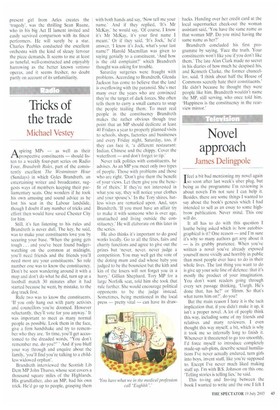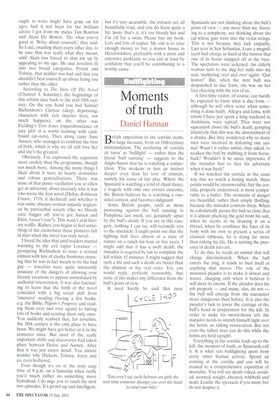Novel approach
James Delingpole Ifeel a bit bad mentioning my novel again so soon after last week's uber plug, but being as the programme I'm reviewing is about novels I'm not sure I can help it. Besides. there are some things I wanted to say about the book's genesis which I had intended to sell as an essay to some highbrow publication. Never mind. This one will do.
It all has to do with this question I loathe being asked which is: how autobiographical is it? One reason — and I'm sure it's why so many authors get arsy about it — is its grubby prurience. When you've written a novel you've already exposed yourself more vividly and horribly in public than most people ever have to do in their whole lives. The last thing you want to do is give up your sole line of defence: that it's mostly the product of your imagination. You don't want readers going through every sex passage thinking, 'Uurgh. He's done that, has he?' or limm. So that's what turns him on?', do you?
But the main reason I hate it is the tacit implication that, if you didn't make it up, it isn't a proper novel. A lot of people think this way, including some of my friends and relatives and many reviewers. I even thought this way myself, a bit, which is why it took me so infernally long to finish it. Whenever it threatened to go too smoothly, I'd force myself to introduce completely made-up sub-plots, describe sexual humiliations I've never actually endured, turn girls into boys, invent stuff. like you're supposed to. Except I've never much liked making stuff up. I'm with B.S. Johnson on this one. 'Telling stories is telling lies,' he said.
This to-ing and fro-ing between the book I wanted to write and the one I felt I ought to write might have gone on for ages, had it not been for the brilliant advice I got from my mates Tim Rostron and Alain De Botton. 'Do what you're good at. Write about yourself,' they said. So I did, emailing them every other day, to be sure that was really what they meant, until Alain was forced to shut me up by appealing to my ego. He said novelists fit into two broad categories, Proust and Tolstoy, that neither was bad and that you shouldn't beat yourself up about being one rather than the other.
According to The Story Of The Novel (Channel 4, Saturday), the beginnings of this schism date back to the mid-18th century'. On the one hand you had Samuel Richardson's Clarissa (deep, depressing, characters with rich interior lives, not much happens); on the other was Fielding's Tom Jones (superabundance of racy plot in a world teeming with cardboard cut-outs). Then along came Jane Austen, who managed to combine the best of both, which is why we all still love her and she's the greatest.
Obviously, I've expressed the argument more crudely than the programme, though not much more. Among the many things I liked about it were its hearty certainties and robust generalisations. There was none of that poncy vacillation you so often get at university about precisely who it was who wrote the first novel (Defoe, Robinson Crusoe, 1719, it declared) and whether it was some obscure woman unjustly neglected by patriarchal society (like we bloody care: bugger off: you've got Austen and Eliot, haven't you?). This wasn't arid literary waffle. Rather, you began to feel something of the excitement those pioneers felt in days when the novel was truly novel.
I loved the idea that until readers started warming to the evil rapist Lovelace — prompting Richardson to issue a revised edition with lots of clunky footnotes stressing that he was in fact meant to be the bad guy — novelists were quite innocently unaware of the dangers of allowing your literary creations to appear unmediated by authorial intervention. It was also fascinating to learn that the birth of the novel coincided with a big social shift from 'intensive' reading (having a few books, e.g. the Bible; Pilgrim's Progress; and reading them over and over again) to having lots of books and reading them only once. You suddenly realised that, for novelists, the 18th century is the only place to have been. We might have got better at it in the centuries since. But most of the really important shifts and discoveries had taken place between Defoe and Austen. After that it was just minor detail. You almost wonder why Dickens. Tolstoy, Joyce and co. even bothered.
Even though it's on at the truly crap time of 8 p.m. on a Saturday when really you'd much rather do something more braindead, I do urge you to catch the next two episodes. It's grown up and intelligent, but it's very accessible, the extracts are all beautifully read, and you do learn quite a bit. Sorry that's it, it's too bloody hot and I'm off for a swim. Please buy my book. Lots and lots of copies. My aim is to raise enough money to buy a manor house in Herefordshire, preferably with a moat and extensive parkland, so you can at least be confident that you'll be contributing to a worthy cause.



























































 Previous page
Previous page